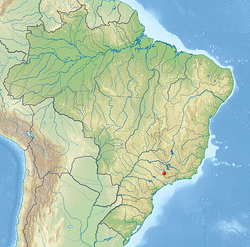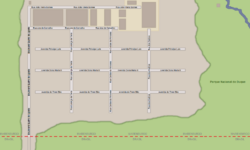Pomerade
Pomerade | |
|---|---|
| Mottoes: Omnia Munda Mundis Everything [is] pure to the pure [men] | |
| Country | |
| Region | Rural |
| Historic countries | Brazil |
| H. of Carvalho | 3 March 1986 |
| Sovereignity | 26 December 2022 |
| Inc. Marienb. | 9 January 2023 |
| Founded by | Ana Carvalho |
| Government | |
| • Type | Executive-led devolved administration |
| • Prefect | António Carvalho |
| Area | |
| • Total | 0.93 km2 (0.36 sq mi) |
| • Water | 0 km2 (0 sq mi) 0% |
| Elevation | 1,196 m (3,924 ft) |
| Population (2022) | |
| • Total | 6 (permanent) |
| • Rank | 2nd |
| Demonym | Pomeradian |
| Time zone | UTC−3 |
| Postal Code (CEP) | 37700-000 |
| Area code | +55 35 |
| HDI (2023) | 0.866 very high (1st) |
| Primary Road | Four August Boulevard |
Pomerade (Portuguese pronunciation: [pomˈeʁˈadˌe]) is a municipality of Marienbourg, comprising the entire rural area of the country, northeast of the capital Blauerhimmel. At 2.5 km², it is the largest municipality in Marienbourg by area, and has a population of 6 permanent residents. Pomerade is divided into 4 burgs, or neighborhoods, entirely surrounded by the Brazilian city of Poços de Caldas. The municipality is administered through an executive-led devolved government by a Prefect elected and is represented in the Ducal Diet by four parliamentarians, three democratically elected and one appointed by the sovereign Duke.
Prior to the Portuguese colonization in South America, the territory corresponding to Pomerade was presumably inhabited by the Aimoré indigenous tribe. With the beginning of colonization, the indigenous people were enslaved to work in the gold mines in Captaincy of Minas Gerais. Following the end of the Brazilian gold rush, frustrated miners settled in the region that was privately owned by a Portuguese fidalgo and later, after the independence of Brazil, became the municipality of Poços de Caldas, in which Ana Carvalho, a descendant of Minas Gerais miners, settled in 1886. After leaving town, however, her descendants eventually returned, establishing, among other things, a middle-sized orange farm. In 2022, Ana Carvalho's great-great-grandson Arthur van der Bruyn, together with two of her grandsons, Edson and António Carvalho, proclaimed the sovereignty of their properties in Poços de Caldas and founded the Duchy of Marienbourg, converting the farm into the municipality of Pomerade.
Pomerade is the country's biggest cultural and gastronomic hub, as well as being Marienbourg's economic powerhouse, accounting for three-quarters of national income. The municipality is known for hosting the biggest cultural events and folkloric festivities in the country and for the strong influence of the Asturleonese culture. The municipality and its orange farms are the reason why the color orange is representative of Marienbourg. Most of the municipality's territory is made up of farms, including Carvalho Brothers farms,[a] and virgin forest. Orangenbäume is still the richest municipality in the country.
Etimology
Kingdom of Portugal 1560–1815
Kingdom of Brazil 1815–1822
Brazilian Empire 1822–1889
Fed. Rep. of Brazil 1889–2022
Duchy of Marienbourg 2022–present
The name "Pomerade" originates from Low Saxon and derives from the fruit bitterorangen, also called pomeranze, which is cultivated in the municipality, plus the German toponymy rade, which means clearing; therefore the name of the municipality means "clearing/glade of bitter oranges". The name was officialiy adopted on 29 November 2023 substituting the former original name of Orangenbäume which was considered too foreign and difficult to spell by the town inhabitants.
History
Pre-cabraline era and colonization
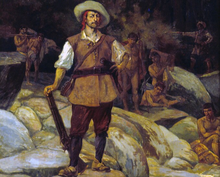
There is evidence of human presence in the geographic region in which Pomeradeis located, dating back at least 11.000 years.[1][2] The pottery found provides evidence that the region supported realtively complex prehistoric cultures organized in social formations such as chiefdoms. Around the time of the Portuguese arrival, the territory of present-day Pomerade was inhabited by a semi-nomadic people, who subsisted on hunting, fishing, gathering, and migrant agriculture, identified as part of the modern ethnic Gê people (locally known as Aimoré), who settled in the region at least 5.000 years ago due to its hot springs originated from the rare volcanic calderas active in the interior of the South American continent. The abundance of resources and access to hot springs made the Aimorés sedentary in that region, which allowed them to prosper far from the harassment.
In 1500 the Portuguese navigator Pedro Álvares Cabral claimed the eastern portion of South America, in which the current Marienbourgish municipality is included, as part of the Portuguese Empire. Although Portuguese colonization effectively began in 1534, it was not until 1560 that the first Portuguese arrived in modern-day Pomerade. Initially natives and the Portuguese Bandeirantes formed a loose alliance against other tribes, but with the discovery of gold in the region, the Portuguese enslaved the Aimoré to work in the mines during the Brazilian gold rush. Nevertheless, in 1750 the Portuguese government outlawed the enslavement of natives in Colonial Brazil. With the end of the gold rush and the transfer of the Portuguese royal court to Brazil, King John VI granted Pomerade and its whereabouts to the fidalgo José Bernardes Junqueira under the name of Paragem of Ribeirão Pinhal
Brazilian rule and the Carvalho family
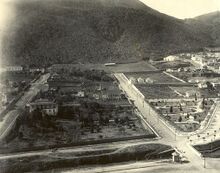
After the independence of the Brazilian Empire and the death of José Bernardes Junqueira, his property was inherited by his nephew Pedro Junqueira. In 1872 Pedro donated 96 hectares of his allotment for the establishment of the municipality of Nossa Senhora da Saúde das Águas de Caldas. That same year, however, the Imperial Senate under senator Joaquim Floriano de Godoy decided to expropriate Pedro's lands, considering them of public utility due to their proximity to sulphurous waters. The government of Province of Minas Gerais proceeded to divide and sell lots of the large land that belonged to Pedro in order to populate the region, incorporated into Poços de Caldas in 1875 after its elevation to the status of city.
The unusual soil rich in volcanic minerals and the exploitation of thermal waters made Poços de Caldas one of the most prosperous cities in Brazil between the end of the 19th century and the beginning of the 20th century. In 1907, 18-years-old peasant Ana de Carvalho moved from het native town of Sete Lagoas to Poços de Caldas in order to work as a hotel receptionist. There, in 1908, she married João Vieira Gomes and in 1909 she gave birth to the couple's only son Geraldo, after which they moved to Minas Gerais' new capital city of Belo Horizonte. However, the family returned many times to Poços de Caldas and the ever-growing development of the city caused them all such impression that in 1986 Edson and António Carvalho, two of Ana's grandsons, bought a 231-acre plot of land and established a orange farm, eventually turning it into a agriculture export company.
Sovereign municipality
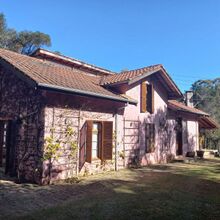
In 26 December 2022 the King Arthur II of Ebenthal approached his great uncles Edson and Antônio Carvalho to explain to them about the micronational political practice and was able to convince them to sign a document in which the monarch appears not as King of Ebenthal, but ex officio as a private citizen, in which the brothers Edson and Antônio pledged to grant the person of Arthur van der Bruyn sovereignty over their properties in the Minas Gerais municipality of Poços de Caldas for as long as they stay subjects of Arthur in the micronation that he would found from those lands, or to which he would annex them. This provided that Arthur hold and keep his position as monarch over those lands. In possession of the sovereignty of those lands, on 9 January 2023 Arthur formally proclaimed his independence from the municipality of Poços de Caldas and Brazil and founded the Duchy of Marienbourg, proclaiming himself sovereign Duke.
Once the duchy was established, the Marienbourgish Government went on to create the administrative subdivisions of the micro country. Separating the country properties into urban and rural zones, while the urban properties became the municipality of Blauberga, the rural property, Carvalho Brothers Farm, was created as the municipality of Pomerade. On 9 February 2023, the municipality had its first elected government. On March 20, by Ducal Decree, the virgin forest area surrounding the town proper of Pomerade was transformed into Duke's National Park, a ecological reserve.
Geography
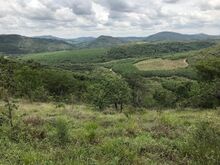
Pomerade is located in the South American Central Highlands region, at 1186 meters (3937 ft) elevation. The municipality is formed by a single vast farm surrounded by virgin forest. The total municipal land, delimited in a rectangular shape, is 0.93 km² and completely surrounded by the Brazilian municipality of Poços de Caldas. Pomerade's terrain is mostly flat and partially bisected by a river adjacent to hot springs on a small stony slope formed by igneous rocks. Due to Pomerade's location within an ancient dormant volcanic caldera, its soil is rich in minerals such as iron and tremendously fertile, albeit |acidic soil.
Subdivision
The city of Pomerade proper consists of four residential buildings and six commercial buildings; it has nine dirt roads, three of which allow access by vehicles while the others are pedestrian paths. The three vertical streets that delimit the plantations of the municipal farm also serve to mark the limits of the four burgs of the municipality.
Climate
Due to its location at 1200 meters (3937 ft) inland elevation, Pomerade, as the rest of Marienbourg, has a humid subtropical climate characterized by dry winters and mild summers. The winter lasts from April to September with an average temperature of 15 °C (59 F) and that rarely drops below 6 °C (42,8 F). During the middle of winter it is common to have frosts. Summer, which goes from October to March, has an average temperature of 21 °C (69,8 F) that rarely exceeds 29 °C (84,2 F) and is marked by a lot of rain (1,745 mm). The maximum temperature recorded in the duchy was 31.7 °C (89 F), while the minimum was -6 °C (21,2 F), a situation in which there was a blizzard. The occurrence of lightning is also very common in the region due to its geolocation which experiences shocks between dry winds coming from the continent and cold fronts advancing from Antarctica, especially during autumn and winter, causing frequent weather changes.
Government and politics
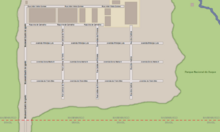
Pomerade is one of the two confederated municipalities that make up Marienbourg, which has no other levels of territorial administrative division. The municipal government is organized as a executive-led devolved government led by a Prefect elected every six months by the local population in secret ballot through universal suffrage. Municipal policy relies on devices of direct democracy and works de facto as a communal system in which the population enjoys heightened autonomy, possessing great political power and influence over the process of governance.
Pomerade exercises its municipal autonomy through organic laws and referendums. The municipality is represented in the Ducal Diet, the national parliament, by four parliamentarians, three of whom are directly elected by the resident population of the city.
Burgs
Pomerade is subdivived into four burgs, akin to neighbourhoods or boroughs. They are the smallest form of territorial division of Marienbourg, although they do not have self-government. However, the municipality's Prefect may appoint Commissioners to act on his behalf and/or represent the boroughs individually before the municipal government. The burgs are divided thorugh three vertical lines, at the Laranja da Terra, Caldas da Princesa e Cedro streets, each. They are:
- Anaxtat; from the Laranja da Terra st. to the left.
- Ranscheterre; between the Laranja da Terra and Caldas da Princesa streets.
- Liebenfeld; between the Caldas da Princesa e Cedros streets.
- Bergau; from the Cedros st. to the right.
Twin towns
Pomerade is twinned with:
 Mariënburg, Ebenthal
Mariënburg, Ebenthal Ölbaum, Ebenthal
Ölbaum, Ebenthal Arigrade, Pannonia
Arigrade, Pannonia
Demographics
Race and ethnicity
Due to the low number of citizens, even fewer residents of Marienbourg, the Ministry of Social Affairs identified only 6 inhabitants of Pomerade, all of whom are white, making the population of the municipality entirely heterogeneous and with a gender ratio of 60% males to 40% females. Despite different ethnic groups contributed to the formation of the population of Pomerade. The entire population of the municipality has primarily Portuguese and Galician ancestry. However, due to the fact that these ancestors immigrated from Europe to South America at least two hundred years ago, their current descendants, despite considering themselves phenotypically white, also have South American natives ancestors, due to the common miscegenation between Portuguese and indigenous peoples.
Religion
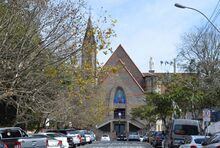
Just as it is racially heterogeneous, so is religion in Pomerade, where the entire population is practicing Roman Catholicism. Pomeradehas a rich and influential Catholic tradition inherited from Brazil, which in turn was inherited from Portugal and Galicia. Nevertheless, the Catholicism seen in municipality, as in the rest of the country, is strongly influenced by Spiritism and shares with it beliefs such as reincarnation that are not observed by the Roman Church. The Marienbourgish state does not recognize or abide to the Igreja Católica Micronacional (En: Micronational Catholic Church). Despite being non-existent in Pomerade, Protestantism and Atheism are often culturally ostracized, but treated with respect by the town's Catholic inhabitants, who try to understand the diverse religious practices and philosophies. Still, some Protestant denominations are viewed with distrust due to some affiliated churches led by pastors continentally controversial and often accused of corruption.
Economy
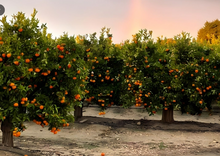
Pomerade is the wealthiest municipality in Marienbourg. With a GDP of ȶ420,000, the city accounts for three-quarters of the national economic output. Agriculture is Pomerade's biggest source of income, followed by tourism and a fledgling retail sector. The municipality is a producer of oranges, different herbs and cedar, in addition to having a subsistence livestock based on raising chickens and pigs. The Carvalho Brothers Agriculture Company has an absolute monopoly on the export of commodities from Pomerade, where it is headquartered, and is the largest company in the country. The tourist industry in Pomerade is occasionally active, with the Carvalho Brothers Agriculture Company organizing visits to the hot springs located in Duke's National Park and tours of cedar and orange plantations. However, this sector is considered secondary and complementary and is directly related to the retail microsector through the sale of souvenirs and consumer products.
The Ministry of Social Affairs estimates that citizens of Pomerade are classified as upper-middle class by Brazilian standards. Although a large part of the income generated by the municipality is reintroduced into its administration and its economy, the Treasury estimates that between 1% and 2% is poured into public coffers annually.
Infrastructure
Roads and transport
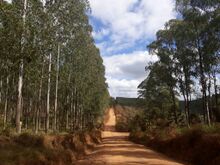
Pomerade is the only part of Marienbourg to have a road, as opposed to the scattered collection of private properties that make up the municipality of Blauberga. Pomerade has nine dirt roads, three of which are only accessible by car, while the rest are pedestrian paths. Boulevard Quatro de Agosto is the backbone of Pomerade, connecting the city to Poços de Caldas, Brazil. Due to typical micronational limitations involving financial and geographic resources, Pomerade does not have, therefore a system of public transportation. The city is, however, served by the public transport system of the neighbouring foreign municipality of Poços de Caldas, primarily through Viação Cometa executive buses. Furthermore, Pomerade has a small fleet of off-road cars, which are the main means of international access.
According to data from the government of Pomerade, three quarters of the population owns at least one car and uses it as the main means of transport between the enclaves that make up the country and also for work and shopping outside. All the cars in Pomerade are from the Japanese brand Toyota and the German brand Volkswagen. Although cars are the most common and popular means of transport in Pomerade, bicycles are also widely used, mainly for commuting to nearby neighborhoods. However, the Ministry of Home Affairs believes that dirt roads discourage the population from using this means of transport.
Education
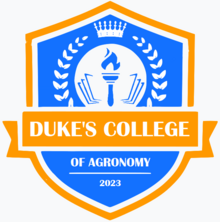
Doted of a rural landscape, Pomerade is home to the Duke's College of Agronomy, Marienbourg's only education institution. The municipality is also home to the Marienbourgish Aerospace Research Institute and Academy which manage the country's space program which is primarily focused in astronomical studies, and also produced essays on how air pollution affects stargazing. Due to Marienbourg geographic and financial limitations as a micronation, i.e., by not having the necessary available land or funds, the country is unable to maintain a complex public education system. Nevertheless, the citizens of Pomerade, all possessing dual Brazilian citizenship, make use of the public and private educational systems of the Brazilian surrouding State of Minas Gerais. The Pomeradian government encourages the studies of its inhabitants and their relatives in the best schools and universities outside its borders and carries out censuses and studies on the subject.
Due to the small population of the municipality, the Ministry of Home Affairs was quickly and easily able to collect educational data which indicates that all residents of Pomerade are literate, with half of the population having attended or completed higher education. The Ministry has also appointed that the main higher education institution attended by the Pomeradians and is the Pontifical Catholic University of Minas Gerais both in Poços de Caldas, near Orangenbäume, as in Belo Horizonte.
Despite Portuguese being the country's as well as the municipality's sole official language, Asturleonese plays an importat role in Pomerade, where two thirds of the inhabitants are descendants of Portuguese immigrants from Miranda do Ouro. The language is primarily spoken by the elderly population, but has been rudimentaryly passed down.
Culture
The Pomeradian culture is a by-product of the general caipira culture common in the countryside of the states of southeast region of Brazil added to factors inherent to the resident population of the municipality, such as their leonese ancestry, which has a strong grip on the development of Pomerade's culture. The stereotype generalizes Pomeradian culture as rural and warm, heavily centered on cuisine and traditional festivities. The population is described as kind, welcoming and even progressive, having been more conservative in the past, but now embracing modern values and adopting new technologies in their daily lives.
Festivities and traditions
The traditions of the Pomeradian people are derived from their ancestry and their alike experiences and are especially related to the Brazilian peasant tradition and the origin of the population in the region of Miranda do Douro in Portugal. Religious festivities are widely celebrated, mainly with suppers and processions, especially the commemorative dates of the days of Our Lady of Aparecida, Saint Anthony and Saint Rita of Cascia. The biggest national festival, however, is the Countryside Music Festival (Festival Musical do Campo), which takes place annually with folkloric and country music performances, mixed dances and rustic food cooked over a wood fire. The Orange Fest (Festa da Laranja), a smaller occasion, occurs a few times a year when there is a big harvest of oranges and the celebration takes place with a tub of orange juice that is served to the field workers.
Cuisine
Pomeradian cuisine draws much from the cuisine of Minas Gerais, with a slight influence from northern Portuguese cuisine. The cultural basis of its cuisine is the small farmhouse, and many of the dishes are prepared using locally produced vegetables and meats, especially chicken and pork, and are traditionally cooked in wood-fired ovens. In addition to meals, the town, as a producer of oranges specially, has a myriad of foods derived from fruit, such as orange cake with fennel and topping of vanilla, mate-and-orange tea and the main dish typical of Pomerade, pork shoulder with orange sauce.
Notes
- ↑ Companhia Agrícola Irmãos Carvalho in Portuguese
References
- ↑ About.com, http://gobrazil.about.com/od/ecotourismadventure/ss/Peter-Lund-Museum.htm Archived 12 August 2017 at the Wayback Machine
- ↑ Robert M. Levine; John J. Crocitti (1999). The Brazil Reader: History, Culture, Politics. Duke University Press. pp. 11–. ISBN 978-0-8223-2290-0. https://books.google.com/books?id=R28K2JA9PM8C&pg=PA11.

